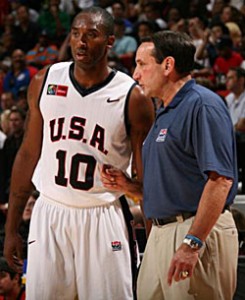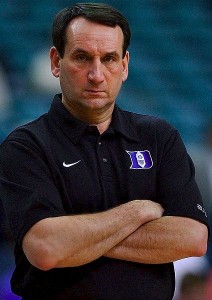Paul M. Banks has an exclusive chat with Duke Head Coach MIKE KRZYZEWSKI.
I actually did this interview last April in Chicago, but since I’m about to head off to the Final Four tomorrow (one in which Duke is appearing) I figured it was a good time to update and re-run this. Also, a good portion of my writers seem to be taking this week off for some reason, so that’s always a good time to rerun stuff.
A brief refresher course on Coach K…
Krzyzewski grew up in Chicago (near Augusta and Damen) and was recruited by Bob Knight to play basketball at the U.S. Military Academy. He went on to become head coach at West Point before taking the same position at Duke University. In his 29th season at Duke, Krzyzewski was inducted into the Naismith Memorial Basketball Hall of Fame after being selected as National Coach of the Year 12 times.
Under his reign, the Blue Devils have won three NCAA championships (1991, 1992, 2001) and 11 Final Fours.
Krzyzewski was named head coach of the USA Basketball Men’s Senior National team, a position he held through the team’s gold medal winning performance in the 2008 Olympic Games in Beijing. (complete biography available here)
The Sports Bank: Talk about the role education and academics plays in collegiate sports, especially at an institution like yours with a high academic reputation
Mike Krzyzeki: We’re all educational institutions, so before we’re a sports team, we’re a college or university and it’s the responsibility of everyone to make sure education is the central point of what we’re doing, it’s not celebrated in the press because there’s no score.
TSB: What about graduation rates?
Coach K: Yeah, but even graduation rates aren’t a true indication of education, the fact that you’re able to educate anybody for even a short period of time is a step forward, hopefully it leads to graduation, it’s one of the reasons I’ve stayed in the collegiate ranks because education is our thing, it’s part of what you do and it’s not just about winning and losing.
TSB: Can you tell me about the new organization, structure and culture of Team USA basketball that Executive Director Jerry Colangleo instilled in the program?
Coach K: I think what Jerry did, was first of all he volunteered , so Jerry’s heart was pure and his sole intention was to make sure USA basketball would be good and he said we’re going to do it the old-fashoned way, we’re not just going to select a team, we’re going to talk to each individual and tell them what we expect of them, to follow our standards and make a commitment.
And the players said, we can do that. And the common expression that was given to me, Jim, Mike D’antoni and all the coaches for this team, and it was “Coach I’ll do whatever you want me to do.” As the coaches behind me can attest, we’d be lucky to hear our own players say that, and we had Lebron James, Dwanye Wade, Kobe Bryant and Chris Paul, these guys are stars. And because of the soil that Jerry had us grown in they said “Coach, I’ll do whatever you want me to do.” And that’s the kind of attitude you want going forward.
TSB: Can you talk about instilling values, leadership, preparing your players beyond the court and the classroom?
Coach K: To me athletics at every level, high school or college, it’s like a testing of all the theories that you learn about in the classroom, you learn about success, failure, you learn about changing limits, you learn about courage, honesty, trust, values and sometimes you fail at those things, but sports provide a proving ground to do it while still under the university umbrella.
TSB: As a fellow Polish-American myself, I’m proud to bring up the fact that our hometown has the largest population of Poles outside of Warsaw
Coach K: Whether you’re Romanian, African-American, Greek, Italian it doesn’t make a difference: Chinese, Japanese you see the celebration of all these cultures all the time.
On the Olympics…
Coach K: The Olympic movement is about more than winning and losing, it’s about sharing cultures, if you’ve seen or been into an Olympic village: during the opening ceremony, Jim and I were walking in with our team and the US delegation in the tunnel and all of sudden you walk out and there are over 90,000 people in the stands and the world is watching and you have all these athletes and coaches from our country, all of them yelling “U-S-A U-S-A!” Later, you go out there and all of a sudden you’re a part of the world and you’re watching all the delegations walk by and you share, and you’re hugging and people talking, it’s kind of the way the world should be.

